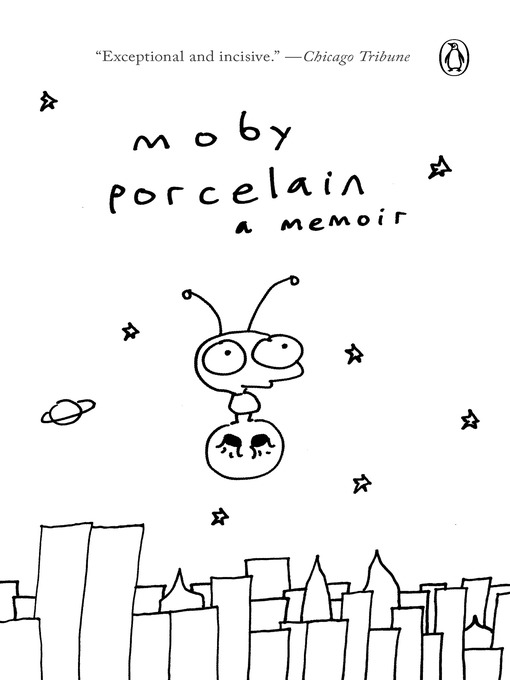
Porcelain
A Memoir
کتاب های مرتبط
- اطلاعات
- نقد و بررسی
- دیدگاه کاربران
نقد و بررسی

Starred review from February 15, 2016
The gazillion record–selling techno rocker recalls 10 alternately absurd and rapturous years breaking into the music biz in this exuberant memoir. Beginning in 1989, when he was squatting in an abandoned factory sending demo tapes into the void, and ending with his 1999 breakout hit, Play, Moby recounts his ascent through deejay gigs at New York dance clubs, where he achieved middling success with his electronic anthems for the rave scene. It’s a story of crummy apartments, psychotic roommates, and no money—the book is a love letter to chaotic 1990s New York—and then of uninhabitable hotel rooms, muddy outdoor festivals, and stages hung with bloody goats’ heads. Moby, a Christian, vegan, and teetotaller, is a monkish anomaly at the party, and though there are episodes of excess—spinning at a swingers’ party; his own stab at public sex—his outsider status makes him a keen, clear-headed, and very funny observer of fleshpots. When he starts drinking heavily and consorting with strippers, he treats the turn neither as liberation nor descent, but as a new chapter that generates both regrets and insights. Moby’s prose is honest, self-deprecating, and full of mordant wit, and when music is playing—“My ears rang with the sound of ten thousand ravers in a field at dawn”—it shines with exhilarating emotion. Agent: Daniel Greenberg, Levine Greenberg Literary.

March 15, 2016
DJ and producer Moby relives the career-defining years, 1989-1999, leading to his international breakthrough album "Play" (1999). In this entertainingly gritty memoir, the author vividly evokes the sights, sounds, and smells of the evolving and increasingly drug-fueled New York City music and street scenes in the 1990s, when neighborhoods like the Meatpacking district and Lower East Side were still the epicenter of New York cool. "By 1993, the music was getting darker and the drugs were getting heavier," he writes. "Audiences were dancing less and passing out in corners more." Moby's journey began in Connecticut--his hometown of Darien and later as a squatter living in a 100-square-foot space in Stamford--but with his rapid ascension as a cutting-edge DJ talent at hip downtown venues, he quickly established himself in NYC. With multiple high-energy electro-dance hits, he embarked on a series of international tours. Brief and frequently amusing episodic adventures in NYC and on the road drive the narrative thrust of much of the story, but the author also meditates on God, veganism, sex, and his complicated feelings about Christianity. "I understood applying ethical criteria to actions that affected other creatures, which was why I was a vegan, but I didn't understand applying ethics to sex and other actions that were consensual or self-directed," he writes. "If I got drunk and had sex in a bathroom with a stripper, was I transgressing a universal ethical code? It felt thrilling to consider that most of the Judeo-Christian ethical codes I'd been raised with were arbitrary. But when I'd been having drunken sex in bathrooms and transgressing Christian ethics, I was still thinking of myself as a Christian. And now I didn't know if I still was." While he documents numerous rave events that collectively feel redundant and somewhat tiresome, Moby's writing comes alive when delving into the creative process of producing his music. A distinctive addition to the recent spate of well-written memoirs by contemporary musicians, a list that would include the likes of Elvis Costello, Patti Smith, and Carrie Brownstein.
COPYRIGHT(2016) Kirkus Reviews, ALL RIGHTS RESERVED.

March 15, 2016
Moby gave up drinking to become a straight-edge, vegan Christian. Poor but smug, he ran bible-study sessions for wealthy, young Christians with the aim of making them feel guilty about being rich. I was a Christian, but I was also a dick. In 1989, while hoping to make it as a DJ in New York, Moby squatted in an abandoned factory in Connecticut. In 1991, he had a surprise hit record, Go, in the U.K. Moby lovingly recreates a dystopian Manhattan dominated by AIDS, drugs, and gang violence and vividly describes the rave scene with its glow sticks, Vicks VapoRub, and smiley faces, not to mention the Ecstasy, ketamine, and heroin. Moby falls off the wagon and enters a debauched era of excess. The nineties conclude with Moby, a bald, has-been musician, dating strippers, missing his mother's funeral, and having sex on a dance floor surrounded by drag queens dressed as Stevie Nicks. This engrossing memoir is an often unflattering, self-loathing peek at the period before Moby's breakthrough album, Play, launched him into superstardom.(Reprinted with permission of Booklist, copyright 2016, American Library Association.)

























دیدگاه کاربران